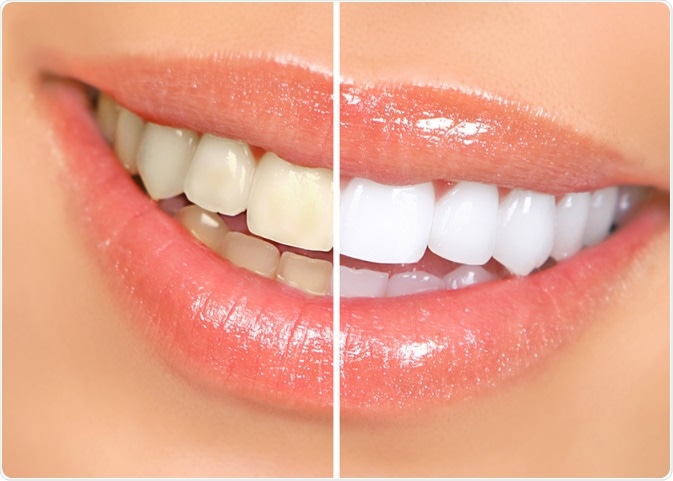Teeth whitening is a cosmetic procedure that is used to make the surface of the teeth appear whiter. Although teeth whitening cannot turn the teeth brilliant white, it can be a very effective way of lightening the existing color, without causing any damage to the tooth’s surface.

Image Credit: kurhan / Shutterstock.com
The effects of teeth whitening are not permanent and can last anywhere from a few months to three years. The duration of the effects varies between individuals; however, in general, the effects do not last as long if a person stains their teeth through smoking or drinking tea, coffee, or red wine, for example.
In Europe and some other countries, only a qualified dental professional is allowed to carry out teeth whitening. In fact, when teeth whitening is performed in beauty salons by people with no dental qualifications, the procedure not only poses a risk to oral health but is also illegal.
Professional teeth whitening
The most common method of whitening teeth is professional bleaching. This involves several visits to the dentist over a couple of months. The dentist takes an impression of the teeth which is used to create trays that fit onto the teeth like mouth guards. The trays are filled with a bleaching gel and the patient is shown how to carry out the procedure at home.
The gel is applied for a certain amount of time, which varies depending on how severe the discoloration is and how white a person wants their teeth to look. Generally, the gel is applied for between 30 and 60 minutes each day, for a total duration of between two and four weeks. Some products can be applied for up to eight hours at a time, in which case the process may be complete in as little as a week.
Home kits
It is possible to buy home kits to bleach the teeth, but these are associated with risks. Although the kits are cheaper, they are not always subjected to safety checks and the gel may be more acidic. Furthermore, if the mouth guard has not been created by a qualified professional, it may be a poor fit, meaning that the bleaching gel could leak into the mouth and damage the teeth and gums.
In Europe, it is illegal to sell any kits containing more than 0.1% hydrogen peroxide, which means that the gel is not strong enough to offer effective whitening. Home whitening may be more common in other countries where stronger gels are sold, but people should be wary of buying these kits over the internet because they may contain gels that are acidic and abrasive.
Laser whitening
Laser whitening is another form of teeth whitening that is carried out by a qualified professional. It involves painting a bleaching product onto the teeth, which is then activated by a laser to accelerate the whitening reaction. This procedure only takes around one hour and is also referred to as “power whitening” or “chair-side whitening.”
Whitening toothpaste
Several whitening toothpastes are available on the market. These products do not change the color of a person’s teeth, but they can be effective at removing any stains or discoloration that have accumulated, therefore helping to restore some of the natural colors and improve the overall appearance of the teeth. These kinds of toothpaste can also be used to prolong the effects of a professional teeth whitening procedure.
Teeth Whitening At The Dentist | Fastest Way To Whiten Your Teeth
Precautions
Before embarking on teeth whitening, a person needs to be free of any oral diseases such as tooth decay, gingivitis, or periodontitis. In addition, teeth should not be sensitive, cracked, or injured.
Unless these conditions are diagnosed and treated adequately prior to teeth whitening, they may become further aggravated and interfere with the success of the procedure.
The steps involved in teeth whitening must begin with a complete dental check. During this check, a dentist and a dental hygienist can help diagnose and treat any problems with the teeth, gums, and mouth before the teeth whitening procedure is carried out. These dental professionals can also advise whether teeth discoloration has a natural cause, is the result of injury, or due to staining from food, antibiotics, tobacco, or coffee. Once the cause is established, the procedure can be carried out with more realistic expectations.
Dentists may also advise on additional options such as the use of tooth-colored crowns, veneers, bonding materials, or tooth-colored fillings.
Effects
The effects of teeth whitening can last for up to three years, although this is unlikely for people who smoke or drink tea, coffee, or red wine, for example.
Some side effects of teeth whitening include sensitivity to the cold, gum discomfort, sore throat, and white patches on the gum line. These effects are usually short-term and clear up within a few days of the treatment. However, people should consult their dentist if any of these effects last longer than a few days.
After the procedure
People often find that their teeth and gums feel much cleaner after a whitening procedure. People can increase the chances of their teeth staying white by cutting down on foods and drinks that stain the teeth and by stopping smoking.
References
Further Reading
Last Updated: Feb 22, 2023